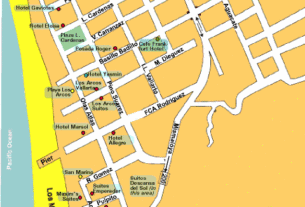When hosteling my way through Europe in my early-twenties, I made daily visits to the local shops for crucial supplies: baguettes, cheese, fruits, nutella, and wine. In those days, I was willing to stop at a boulangerie for bread before heading to the patisserie for sweets, unruffled by squeezing and thumping my way through vegetable stalls, patient to wait for the butcher to slice my jamon. Food shopping was part of the foreign travel experience – a chance to rub elbows with the locals, an invitation to develop a sophisticated palate on a budget. Each foreign grocery was an interactive museum, housing a collection of tastes, smells, and sounds.
I’ve been living in Mexico City for over a year. Like Europe, there are specialty shops for everything under the sun. But my days of filling the pantry store by store are over. Today, I prefer to shop like the American I am – in a supermarket where everything I need is under one roof. Fortunately, there is a Superama right around the corner.
I love the specialty shops, the tiendas, the bodegas on every corner. But living outside of the states lends itself to a certain longing for familiarity. Perhaps that is why my daily trips to Superama are such a complex experience, embodying all I love and hate about my host country and my native one.
Like Mexico City itself, the layout of the place just doesn’t make sense to me. The store’s entryway is only large enough for one person with a shopping cart at a time. Unfortunately, the way in is also the way out. So, I regularly find myself waiting while shoppers, carts overflowing with purchases, stream out the door. There is no “right of way” as far I as I can tell; you go when you can. Forget courtesy, only the pushier shoppers make it inside, halfway done with their errands while I meekly wait for an opening.
Inside, the aisles are narrow – too narrow to turn a cart around if you suddenly realize that you are headed for the soups and not the cereals. To make matters worse, they wash the floors constantly, and while I agree that cleanliness is of utmost importance where food is concerned, I have had my share of wipe-outs trying to turn my cart around on the slick, wet linoleum.
Who knew that grocery shopping would be the biggest adjustment I’d have to make living in another country? I expected to substitute local ingredients in my favorite recipes, but there seems to be little logic as to what is available here. I can find fresh green beans, but not canned. Chocolate sprinkles, but not chocolate chips. Creme fraiche, but not sour cream. Baking powder, but not baking soda. Cornstarch, but not cornmeal.
At check out, the cashiers ask each customer if they found everything they were looking for. I always answer with si. In part, because it somehow seems rude to ask for my “gringo” products- never mind that Oreos and Haagen Dazs are always in stock. And in part (though I’m loathe to admit it) because I don’t always know the Spanish word for the thing I’m looking for. Sure, I know that baking powder is polvo para hornear, but could baking soda really be refresco para hornear? Somehow, I doubt it.
I have found myself in line behind customers unencumbered by language difficulties who confidently rattle off the things that they failed to find. Each time, the cashier adds the names of the items to a list she keeps behind the register. I’m not certain what becomes of the list, but I have a theory.
I shop at Superama daily and every day, it’s a different store. The aisles remain in the same places, but the specific products vary. Sesame oil was on the shelf on Tuesday, but there is no trace of it on Wednesday. Where those macadamia nuts were yesterday? Today, only almonds and peanuts. Sometimes there are raspberries, at other times only blueberries. It’s not a seasonal thing. The culprit lies in those “unfound item” lists kept by the cashiers. The market orders its stock based on those lists, I’m sure of it. A few unsatisfied customers determine what I will be eating for dinner.
The produce isn’t especially fresh: the tomatoes are orange more often than red and it takes a thorough search to find a head of lettuce that isn’t half-wilted. The meat can be tough, and usually is. But Superama’s bouquets stay fresh days longer than the ones from the flower shop down the street. The smell of the bakery section beckons from half a block away. The sugar cookies and freshly baked bolillos are addictive.
After searching the entire neighborhood for a toilet plunger, I found one at Superama. In a pinch, I can buy extra flatware for a dinner party and cheaply replace the glasses that I constantly break while washing dishes. Not only will they fill prescriptions; they’ll make you a sushi party platter to order. I don’t have a car, but if I did, the teenager who bags my groceries would help me carry them out to it.
Every afternoon, employees offer free samples of everything from bread to salami to yogurt to Kahlua. Time your visit right, and you won’t have to fix lunch. Or cocktails. They play real music with an actual beat and familiar lyrics and yes, I’ve caught myself singing along.
If I don’t know what to make for dinner, I take inspiration from what’s available. I’ve even adapted my grocery list to resemble a scavenger hunt. “1) A type of meat for grilling, 2) berries appropriate for dessert, 3) a fragrant herb found in salad dressing, 4) a cleaning product.” Who doesn’t love a scavenger hunt? And while I know that there’s an old-school mercado a few blocks further up the street, I prefer my Superama. My home away from my home away from home.
Sally Davis Ellwein is a citizen of the U.S., living and writing in Mexico City, Mexico.



